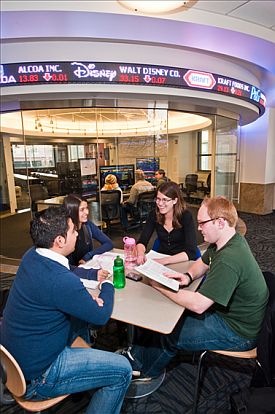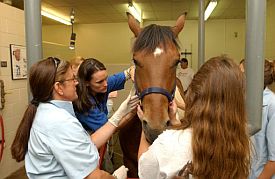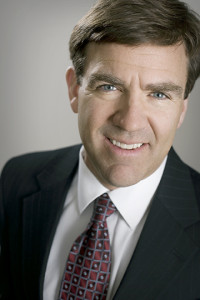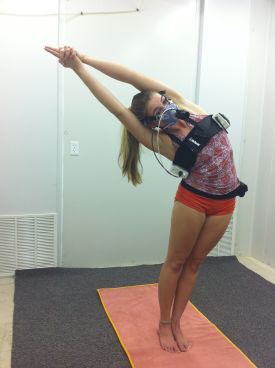Preserving cultural heritage during war – it’s all in the cards
War has its casualties, and for centuries combat zones have stacked the cards against cultural heritage preservation.
War has its casualties, and for centuries combat zones have stacked the cards against cultural heritage preservation.
The Office of the Vice President for Research has selected longtime chemistry professor Ellen Fisher to serve on its leadership team.
Colorado State University, among the nation's leading research universities, also ranks highly for graduation rates and affordability, according to the newly released College Scorecard developed by the U.S. Department of Education. World-class education
 The College Scorecard makes it easier to search information about a college’s value and affordability.
The College Scorecard makes it easier to search information about a college’s value and affordability.
“Students at CSU are getting a world-class education and outstanding undergraduate research opportunities, and the new College Scorecard shows we’re also providing an exceptional value,” CSU President Tony Frank said. “Our students are graduating at a higher rate, leaving CSU with less debt than the national average, and defaulting on their student loans at a much lower rate than their peers. In fact, thanks to our emphasis on providing more student scholarships and aid, the average net price our students pay to attend CSU went down even as tuition was going up. This is great information for students to have when they’re weighing their college options.”
CSU is the most affordable research university in Colorado while boasting a high graduation rate, according to the U.S. Department of Education. The College Scorecard also shows that the university is the only institution among Colorado’s research universities to decrease in average net price in recent years. CSU’s graduates have a low loan default rate of only 4.8 percent, while the national average is 14.7 percent. Record enrollment, high retention The high marks from the College Scorecard come at a time when CSU is consistently seeing record enrollment and strong retention rates. The College Scorecard website contains information from colleges around the country and can be found at the website. Premier research university Colorado State University is one of the nation’s premier research universities routinely highlighted in national rankings recognizing top universities and programs:
Colorado State University is one of the nation’s premier research universities routinely highlighted in national rankings recognizing top universities and programs:
 CSU’s professional doctoral veterinary medicine program is ranked No. 3 in the nation according to U.S. News and World Report’s 2014 Best Graduate Schools edition. The College of Veterinary Medicine and Biomedical Sciences consistently places among the top three vet schools in the nation. It is also ranked third in the nation in federal research dollars.
CSU’s professional doctoral veterinary medicine program is ranked No. 3 in the nation according to U.S. News and World Report’s 2014 Best Graduate Schools edition. The College of Veterinary Medicine and Biomedical Sciences consistently places among the top three vet schools in the nation. It is also ranked third in the nation in federal research dollars.A new online Speakers Bureau of Colorado State University experts provides the community another professional resource.
Summer is peak season for horse shows and events, and Colorado State University veterinarians remind riders that it's important if traveling to take steps that will help prevent the spread of equine infectious disease. Recent cases and outbreaks of equine herpesvirus-1 (EHV-1), which can cause potentially fatal neurologic disease, have drawn attention to the need for prevention. Influenza, salmonellosis and strangles are some other infectious diseases of concern, said Dr. Paul Morley, director of infection control at CSU’s James L. Voss Veterinary Teaching Hospital. A new CSU video, “Preventing Infections in Horses Attending Shows and Traveling,” outlines specific, low-cost precautions for horse owners. “Some advance planning and a few low-cost, common-sense preventative measures will help keep horses healthy while traveling,” Morley said. “Protecting the health of your horse makes these steps well worth the time and thought.” CSU veterinarians advise horse owners to thwart infection by understanding and watching for symptoms of illness. They also recommend precautions including disinfecting trailers and equipment, and preventing contact that could spread pathogens. Traveling tips Morley recommends that riders traveling with horses take the steps outlined below; these tips are discussed in more detail in the CSU video.
The School of Social Work recently renamed its online Mediation Certificate of Completion
 For the 2014-2015 academic year, Paul Metz will serve as interim chair of the Department of Music, Theatre and Dance at Colorado State University. This appointment follows the announcement that Todd Queen, department chair since 2009, was named dean of the Louisiana State University College of Music and Dramatic Arts.
For the 2014-2015 academic year, Paul Metz will serve as interim chair of the Department of Music, Theatre and Dance at Colorado State University. This appointment follows the announcement that Todd Queen, department chair since 2009, was named dean of the Louisiana State University College of Music and Dramatic Arts.
Metz received a B.A. in Music from Gettysburg College, and the M.M. and Ph.D. in Music Theory from the College-Conservatory of Music of the University of Cincinnati.
Metz has served as coordinator of music theory at Colorado State University since he arrived in 1986. During his time in the department he has also been assistant chair, acting chair, director of undergraduate studies, coordinator of the B.A. in Music degree program, and adviser to honors students.
“I want to express my sincere appreciation to Paul for his willingness to serve the department during a time of transition,” said Ann Gill, dean of the College of Liberal Arts. “Because he has been involved with the department in a variety of roles, I have confidence in his ability to take on this challenging new role.”
A search for a new chair of the Department of Music, Theatre and Dance will commence in fall of 2014. More information will be available on the department website. Contact: Carrie Care, (970) 491-5891They envisioned a place where students could learn forestry and other disciplines in a living classroom. Today, 100 years later, Pingree is home to a campus and conference center that hosts more than 5,000 annual visitors.
As Colorado’s craft beer industry continues to flourish, Odell Brewing Co. in Fort Collins and its owners are investing in the state’s future brewers.
Researchers at Colorado State University have produced some of the first scientific evidence that Bikram yoga, a type of "hot yoga," has beneficial effects on fitness. They are also the first to quantify the number of calories burned while practicing this yoga.
Brian Tracy, associate professor in CSU’s Department of Health and Exercise Science, presented his lab’s findings in May at the national conference of the American College of Sports Medicine.
90 minutes at 105 degrees
Bikram yoga is a standardized 90-minute session featuring 26 postures and two breathing exercises performed in a room heated to 105 degrees Fahrenheit and kept at 40 percent humidity. In his most recent study, which was highlighted in recent online issues of Time and Glamour magazines, Tracy measured the body’s response to a yoga session performed by 19 seasoned 18- to 40-year-old Bikram practitioners – 11 women and eight men.
He found that the participants showed elevated heart rates averaging about 160 beats per minute and core temperatures averaging 100.3 degrees F, all within a safe range. Tracy also found that the body’s average metabolic rate, or calories burned, was roughly equivalent to walking briskly (about 3.5 miles an hour) for a full 90 minutes.
Some practitioners have reported burning as many as 1,000 calories in one Bikram yoga session, but Tracy said the figure in his study averaged about 460 calories for men and 330 for women. Differences in body size explained the caloric difference between the sexes.
Calorie equations
According to Tracy, the previous higher calorie estimates are likely due to practitioners using a calculation based on their heart rate response during hot yoga, but that prediction equation is only appropriate for exercise at normal temperatures. Elevated temperatures in the hot yoga studio produce higher heart rates, which doesn’t necessarily translate into higher metabolic rates or calorie consumption, he said.
“That prediction equation results in an inflated estimate of the calories being burned,” he said. “We didn’t predict calories burned, we actually measured metabolic rate for the first time. This number of calories burned can still contribute to weight loss with regular participation.”
Tracy found that Bikram yoga has a variety of positive effects on fitness and lifestyle, and results vary: The participants’ age, body mass, pace, yoga experience, weight, motivation, and other factors could result in higher or lower calorie-burning and weight loss. Those populations haven’t been scientifically studied yet.
Previous research
[caption id="attachment_532" align="alignright" width="275"] Colorado State University researchers have produced some of the first scientific evidence that Bikram yoga, a type of "hot yoga," has beneficial effects on fitness.[/caption]
Tracy’s study builds on previous groundbreaking research from his lab. In 2008, he led the first scientific study on the physiological effects of Bikram yoga, published in the Journal of Strength and Conditioning Research, which found that muscle control, balance and strength were improved in a group of test subjects who had never tried Bikram yoga before.
In that study, participants undertook an eight-week, 24-session yoga program and showed measurably better results than a control group that remained inactive. In a subsequent 2013 research paper in the same journal, Tracy and his co-authors reported that the subjects showed significant gains in spine, hamstring and shoulder flexibility and improved whole body strength, but cardiovascular performance and aerobic fitness remained largely unchanged, probably due to the brief training period and beginning healthy cardiovascular status of the participants.
Tracy’s latest research was funded by Bikram’s Yoga College of India and PURE Action, Inc., a yoga research and education nonprofit advocacy group, neither of which had prior review or control over the results of the study. In addition to collaborators Apurba Mukherjee from the Bikram College and Stacy Hunter from PURE Action, co-authors were CSU doctoral student Megan Fritz and research assistant Amy Grossman.
Research lacking
Tracy said that considering its popularity and volume of anecdotal positive health effects, there is a dearth of research on Bikram yoga; he and various co-authors have produced two of the five peer-reviewed papers that have been published on the physiological effects of the regimen. The paper on the new study, which would be the sixth, is still being drafted for publication.
Bikram yoga, a style introduced to the United States in the 1970s by Bikram Choudhury, is offered at hundreds of licensed studios around the world, taught by instructors who have undergone a specific training program by Bikram’s Yoga College of India, based in Los Angeles.
The Department of Health and Exercise Science is in the College of Health and Human Sciences at CSU.
Colorado State University researchers have produced some of the first scientific evidence that Bikram yoga, a type of "hot yoga," has beneficial effects on fitness.[/caption]
Tracy’s study builds on previous groundbreaking research from his lab. In 2008, he led the first scientific study on the physiological effects of Bikram yoga, published in the Journal of Strength and Conditioning Research, which found that muscle control, balance and strength were improved in a group of test subjects who had never tried Bikram yoga before.
In that study, participants undertook an eight-week, 24-session yoga program and showed measurably better results than a control group that remained inactive. In a subsequent 2013 research paper in the same journal, Tracy and his co-authors reported that the subjects showed significant gains in spine, hamstring and shoulder flexibility and improved whole body strength, but cardiovascular performance and aerobic fitness remained largely unchanged, probably due to the brief training period and beginning healthy cardiovascular status of the participants.
Tracy’s latest research was funded by Bikram’s Yoga College of India and PURE Action, Inc., a yoga research and education nonprofit advocacy group, neither of which had prior review or control over the results of the study. In addition to collaborators Apurba Mukherjee from the Bikram College and Stacy Hunter from PURE Action, co-authors were CSU doctoral student Megan Fritz and research assistant Amy Grossman.
Research lacking
Tracy said that considering its popularity and volume of anecdotal positive health effects, there is a dearth of research on Bikram yoga; he and various co-authors have produced two of the five peer-reviewed papers that have been published on the physiological effects of the regimen. The paper on the new study, which would be the sixth, is still being drafted for publication.
Bikram yoga, a style introduced to the United States in the 1970s by Bikram Choudhury, is offered at hundreds of licensed studios around the world, taught by instructors who have undergone a specific training program by Bikram’s Yoga College of India, based in Los Angeles.
The Department of Health and Exercise Science is in the College of Health and Human Sciences at CSU.